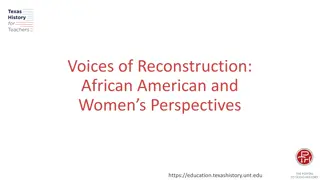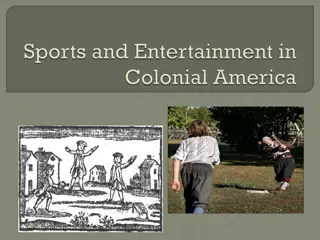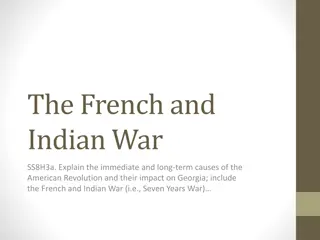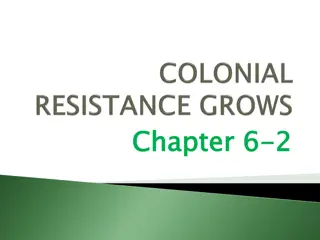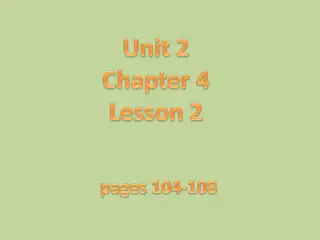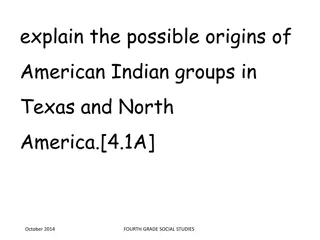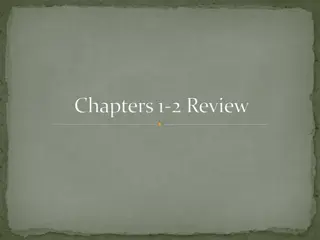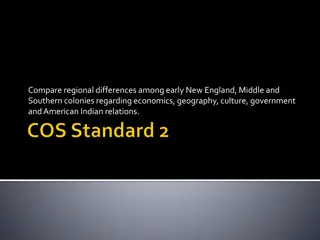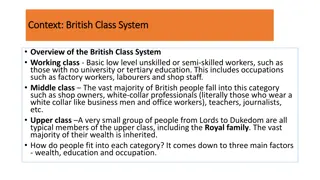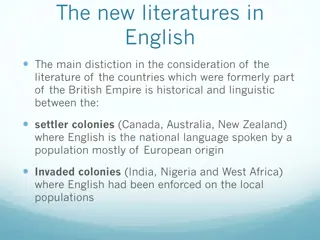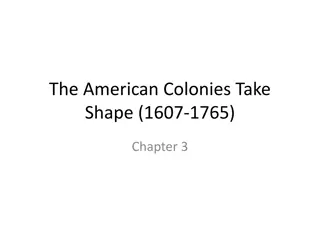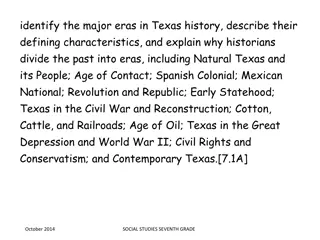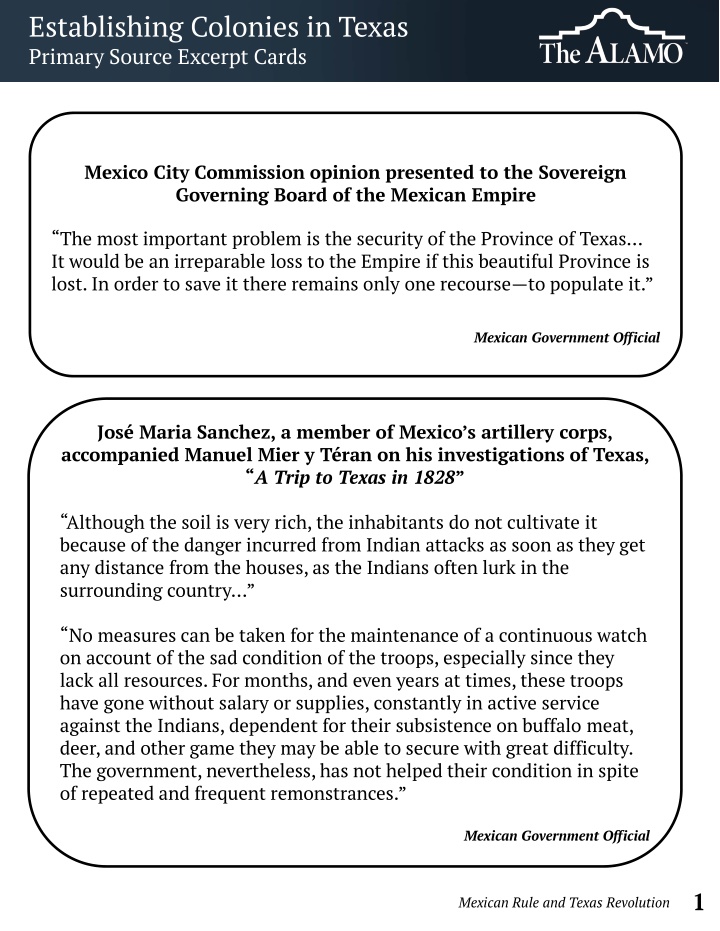
Colonizing Texas: Challenges and Strategies in Mexican Empire
Explore the primary source excerpts revealing the challenges faced in establishing colonies in Texas, including security concerns, Indian attacks, lack of resources for troops, and the perspectives of Mexican officials, Tejano residents, and Anglo colonists. Discover the push for populating Texas, debates on admitting foreigners, and the agricultural potential of the region, as documented in historical documents and correspondence from the early 19th century.
Download Presentation

Please find below an Image/Link to download the presentation.
The content on the website is provided AS IS for your information and personal use only. It may not be sold, licensed, or shared on other websites without obtaining consent from the author. If you encounter any issues during the download, it is possible that the publisher has removed the file from their server.
You are allowed to download the files provided on this website for personal or commercial use, subject to the condition that they are used lawfully. All files are the property of their respective owners.
The content on the website is provided AS IS for your information and personal use only. It may not be sold, licensed, or shared on other websites without obtaining consent from the author.
E N D
Presentation Transcript
Establishing Colonies in Texas Primary Source Excerpt Cards Mexico City Commission opinion presented to the Sovereign Governing Board of the Mexican Empire The most important problem is the security of the Province of Texas It would be an irreparable loss to the Empire if this beautiful Province is lost. In order to save it there remains only one recourse to populate it. Mexican Government Official Jos Maria Sanchez, a member of Mexico s artillery corps, accompanied Manuel Mier y T ran on his investigations of Texas, A Trip to Texas in 1828 Although the soil is very rich, the inhabitants do not cultivate it because of the danger incurred from Indian attacks as soon as they get any distance from the houses, as the Indians often lurk in the surrounding country No measures can be taken for the maintenance of a continuous watch on account of the sad condition of the troops, especially since they lack all resources. For months, and even years at times, these troops have gone without salary or supplies, constantly in active service against the Indians, dependent for their subsistence on buffalo meat, deer, and other game they may be able to secure with great difficulty. The government, nevertheless, has not helped their condition in spite of repeated and frequent remonstrances. Mexican Government Official 1 Mexican Rule and Texas Revolution
Lesson Plan: Colonizing Texas Primary Source Excerpt Cards Representative Argandar from Michoacan in debates of November 23 and November 26, 1822 If they wish to come, they will do under the condition that they will not have slaves. This will be the highest honor of the Mexican nation. Mexican Government Official Governor Antonio Martinez to Gaspar Lopez on February 6, 1822 It is absolutely necessary that the nation make some effort to populate it admitting foreigners would be the easiest, least expensive, and fastest mode. Tejano Resident Governor Antonio Martinez 1820 From now on, I am not responsible for defending and controlling this province that has been placed under my protection. Tejano Resident 2 Mexican Rule and Texas Revolution
Lesson Plan: Colonizing Texas Primary Source Excerpt Cards Jose Francisco Ruiz to Stephen F. Austin on Nov. 30, 1826 I cannot help seeing the advantages which, to my way of thinking, would result if we admitted honest, hardworking people, regardless of what country they come from even hell itself. Tejano Resident Stephen F. Austin to Joseph H. Hawkins on July 20, 1821 The objects of this settlement are entirely agricultural. This richness of the soil, healthfulness of the climate, contiguity to the sea, and other natural advantages, promising a reward to our labors, which few spots on the globe could furnish to an equal extent I hope the newspapers in Mississippi, Tennessee, Kentucky, and Missouri will republish. Anglo Colonist Stephen F. Austin quoted in the Richmond Enquirer November 20, 1821 to each individual settler at least 1000 acres of land, for agricultural purposes, and an additional quantity to settlers in proportion to the size of their families, number of their slaves, and resources they possess for cultivating the soil. Anglo Colonist 3 Mexican Rule and Texas Revolution
Lesson Plan: Colonizing Texas Primary Source Excerpt Cards Stephen F. Austin s diary on first trip to Texas on September 17, 1821, page 21 These Indians may be called universal enemies to man An American population will be the signal of their extermination for there will be no way of subduing them but extermination. Anglo Colonist Stephen F. Austin to Edward Lovelace on Nov. 22, 1822 The principal difficulty is slavery, this they will not admit - as the law is all slaves are to be free in ten years, but I am trying to have it amended so as to make them slaves for life and their children free at 21 years - but do not think I shall succeed in this point Anglo Colonist Guerrero Decree: 1. Slavery is abolished in the republic. 2. Those who up to now had been considered as slaves are therefore free. 3. When the circumstances of the treasury allow it, slave owners will be indemnified in the terms provided by law. And so that everything contained in this decree has its fullest compliance, I command that it be printed, published and circulated to those who correspond. Anglo Colonist 4 Mexican Rule and Texas Revolution
Criminal Regulations in Austins Colony June 1824 Article 1: on the appearance of any Indian or Indians in the neighborhood of any of the settlements of this colony, whose conduct justified a belief that their intentions are to still, or community hostilities, or who threaten any settler, or are rude to women or children, it shall be the duty of all and every person to take such Indian or Indians into custody, if in his or their powder to do so, and convey them forthwith to the nearest alcalde, or captain of militia, avoid the use of arms in all cases, unless compelled to resort to them. Article 2: In case the Indian or Indians mentioned in the last article should be so numerous as to require a strong party to take them, and the men in the immediate neighborhood are insufficient, it shall be the duty of the person who first discovered them, or who are the most interested in their removal, to give notice thereof to the nearest captain of the militia Articles 10-14 relate to runaway slaves, kidnapping enslaved individuals, theft by enslaved people etc. Article 25: Should any piratical or other vessels of a doubtful or suspicious character appear on the coast, or enter any river or inlet within this colony, it should be the duty of the person or persons who discovers them to give immediate information to the nearest alcalde, or to the political chief of the colony. Anglo Colonist 5 Mexican Rule and Texas Revolution
Census of Austin Colony 1826 Anglo Colonist Census of Austin Colony 1826 Anglo Colonist 6 Mexican Rule and Texas Revolution

